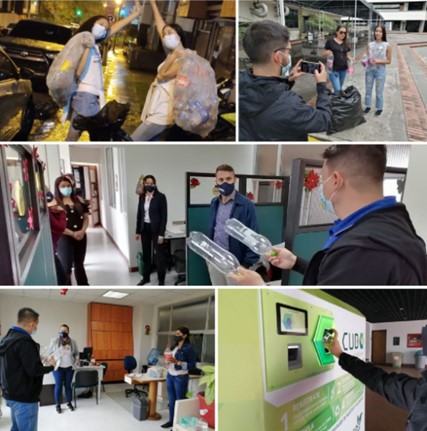Manizales (Colombia), 12/15/2022, Paola Andrea Calderón Cuartas, professor Catholic University of Manizales.- The Catholic University of Manizales, from its mission of integral education, has consolidated its commitment to contribute to the Care of the Common Home and to build a Vital Campus, in coherence with its corporate value and its institutional dream of forging day by day integral men, women, leaders and builders of a new humanity.
 Bottle collection campaign “A thousand bottles to recycle, a thousand ways to help”. This is how from the academy, the congregation endorses the concern for the care of the common home and for the construction of a more humane society.
Bottle collection campaign “A thousand bottles to recycle, a thousand ways to help”. This is how from the academy, the congregation endorses the concern for the care of the common home and for the construction of a more humane society.With its educational purpose of "developing an ethical, political, environmental and ecological conscience for the responsible exercise of the profession for the common good, with ethical and scientific rigour and a commitment to solidarity", it is radically committed to the defense of life.
It is also committed to an Environmental Culture and Management with the following aims:
1. To achieve the management of environmental knowledge by the university community through the mainstreaming of the environmental dimension in the substantive functions of teaching, research and social projection.
2. To contribute to the consolidation of a vital Campus that allows the experience of an environmental ethic and the progressive establishment of a culture of care, towards the minimization of the deterioration of our Common Home and the integral application of university social responsibility.
In this sense, the achievements that UCM has had in the perspective of sustainability are:
1. MMeasurement of the Institutional Carbon Footprint considered a key indicator that quantifies the greenhouse gas emissions that cause climate change, in the current scenario of planetary crisis.
2. Consolidation of the educational-communicative strategy Soy Consciente, soy UCM (I am aware, I am UCM) from which various awareness-raising, appropriation and empowerment actions are carried out to move towards pro-environmental and pro-social behaviour in the university community.
3. Periodic monitoring of environmental performance indicators: water, energy, gas and paper consumption, generation of usable, non-usable, post-consumer and hazardous waste.
4. Integrated Solid Waste Management, highlighting CUBO R3 as an intelligent device for the separation at source of packaging and the implementation in 2022 of the Autonomous Composting System, which transforms organic waste into fertilizer.
5. Outstanding participation in global rankings and evaluations with a sustainability perspective, such as the Newman Framework for University Social Responsibility, Green metric for sustainable universities and Times Higher Education for Sustainable Development Goals.
2. To contribute to the consolidation of a vital Campus that allows the experience of an environmental ethic and the progressive establishment of a culture of care, towards the minimization of the deterioration of our Common Home and the integral application of university social responsibility.
In this sense, the achievements that UCM has had in the perspective of sustainability are:
1. MMeasurement of the Institutional Carbon Footprint considered a key indicator that quantifies the greenhouse gas emissions that cause climate change, in the current scenario of planetary crisis.
2. Consolidation of the educational-communicative strategy Soy Consciente, soy UCM (I am aware, I am UCM) from which various awareness-raising, appropriation and empowerment actions are carried out to move towards pro-environmental and pro-social behaviour in the university community.
3. Periodic monitoring of environmental performance indicators: water, energy, gas and paper consumption, generation of usable, non-usable, post-consumer and hazardous waste.
4. Integrated Solid Waste Management, highlighting CUBO R3 as an intelligent device for the separation at source of packaging and the implementation in 2022 of the Autonomous Composting System, which transforms organic waste into fertilizer.
5. Outstanding participation in global rankings and evaluations with a sustainability perspective, such as the Newman Framework for University Social Responsibility, Green metric for sustainable universities and Times Higher Education for Sustainable Development Goals.
Finally and especially noteworthy are the actions led by the Vice Rector's Office for University Welfare and Pastoral Care in alliance with the Environmental Management Office, including the campaign "A thousand bottles to recycle, a thousand ways to help" carried out in 2021, the main objective of which was to collect 1000 plastic bottles to contribute to the entrepreneurship of the women in the Villa Josefina prison in Manizales. Through videos and awareness-raising for the community in general, not only did the important work of the UCM Leadership School become evident, but also the effectiveness of the R3 Cube in separating waste with recyclable potential. The donation of 600 plastic bottles was achieved and the reactivation of the CUBE R3 with 101 new users in the digital application.
Likewise, in 2022, UCM joined the Megacolegio San Sebastián project "Changing habits, transforming lives", collecting 250 eco-bricks for the construction of the park and the sandbox of the Megacolegio San Sebastian de Manizales, which were designed by the students of the Architecture programme.


 EN
EN  ES
ES  FR
FR 




